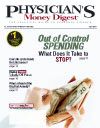Publication
Article
Physician's Money Digest
Giving When Your Gift Will Give the Most
Author(s):
During your lifetime andat the time of yourdeath, federal gift andestate taxes can applyto the transfer of propertyto your heirs. But there are exclusionsfor these rules, and it's importantto think about how these could benefityou when making gifts. To help giveyou a better idea, first understandwhat the exclusions are and how theyare applied.
The Nuts and Bolts
The gift tax annual exclusion allowsyou to transfer up to $12,000 per recipientper year without having to pay anyfederal gift tax. The government has nolimits on who or how many people youcan give a gift to. For example, a marriedcouple can make a gift of up to$24,000 per recipient per year.
These limits refer to the annualexclusion; they do not prohibit youfrom giving more, if you choose. Butif you exceed the annual exclusionamount, you begin using up what'sknown as your lifetime "gift tax applicableexclusion." This exclusion allowsan individual to make gifts in excess ofthe annual exclusion of up to $1 million.Again, the exclusion would bedouble that, or $2 million, for marriedcouples. Once your gifts have reachedthose limits, any additional gifts will besubject to normal gift tax rates.
In addition to discussing gift taxes,you also need to take into considerationhow estate taxes would affect anygift you plan on making. The estate taxapplicable exclusion for 2007 is $2million. That means no federal estatetaxes would be due on the estate of anindividual who dies in 2007, unlessthat estate was worth more than $2million. This estate tax exclusionamount is scheduled to increase to$3.5 million in 2009.
The Benefits of Giving Now
If you make a $12,000 annualexclusion gift to a child or grandchild,then obviously they receive a $12,000benefit now. But if that same $12,000were transferred upon your death as apart of their inheritance, it would bepart of your taxable estate. Assumingthe current minimum estate tax bracketof 45%, your child or grandchildwould only receive a $6600 benefitfrom your gift, net of estate tax.
To really see the benefit of lifetimegifting, keep in mind the future appreciationthat could result from your gift.For example, that same $12,000 giftcould appreciate to nearly $26,000over 10 years, assuming an 8% return.If your child received a $26,000 inheritancefrom your estate, they could endup with just $14,300 after payingestate taxes. These examples make itclear that giving the gift now canpotentially help your family enjoy alarger benefit.
Giving a gift of cash, securities, orany other asset can help provide importantfunds for your child or grandchild.The gift could be used for education,the purchase of a new home, or even ascapital to start a new business. Talkwith a professional today to discussyour options, and make a gift that willhave a lasting effect.
Joseph F. Lagowski is vice president, investments,and a financial consultant with AGEdwards in Hillsborough, NJ. He welcomesquestions or comments at 800-288-0901, orvisit www.agedwards.com. This article wasprovided by AG Edwards & Sons, Inc, member SIPC.
